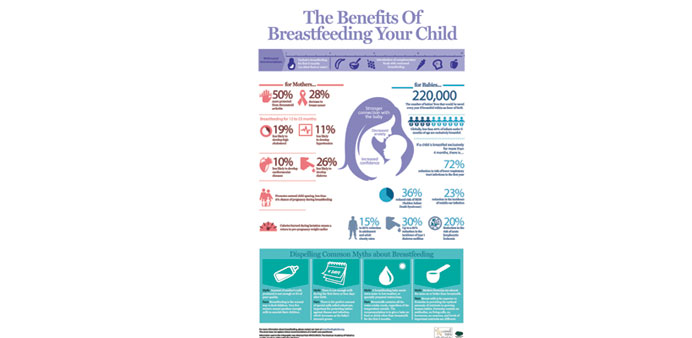A study on breastfeeding by Sidra Medical and Research Centre has found that many mothers discontinue breastfeeding after 40 days, or after three months due to lack of information and access to professional lactation support.
This has been cited as the major reason for low rates of exclusive breastfeeding among Qatari Women. Breastfeeding rate in Qatar is significantly lower than the global rate.
Sidra Medical and Research Centre, through its Community Relations and Development Department, conducted a qualitative study of newborn breastfeeding practices and the sources of information about these practices among Qatari women.
Another finding of the study is that young mothers are led to believe, through traditional practices, that drinking water themselves negatively affects the postpartum body after childbirth. Therefore, many new mothers do not consume healthy food that would allow for proper breastfeeding.
The study also suggests that many new and young mothers in the focus groups are greatly influenced by the traditional practices which require feeding the newborn sugar water or anise water. The study has found that there is a gap between understanding the significance and benefits of breastfeeding and actual practice.
Exclusive breastfeeding rate in Qatar, which is 12% according to Unicef figures from a 2005 study, is lower than the global rate (37%) and significantly lower than the target rate set by the World Health Organisation which is 50%.
Qatar’s National Health Strategy (NHS) aims to address this issue and increase the percentage of infants exclusively breastfed for the first six months through an enhanced prenatal care system focusing on appropriate prenatal care and guidance.
The objective of this year’s World Breastfeeding Week, held every year from August 1 to 7, is to draw attention to the importance of peer support in helping mothers to initiate and sustain breastfeeding. Peer counselling is a highly effective and beneficial tool to support breastfeeding mothers and babies.
The World Health Organisation (WHO) and Unicef recommendations for infant feeding is initiation of breastfeeding within one hour after birth, followed by exclusive breastfeeding for the first six months of life, followed by the introduction of complementary foods at the age of six months with continued breastfeeding for two years or longer.
According to studies endorsed by organisations including the WHO, Unicef, The American Academy of Pediatrics and The Academy of Breastfeeding Medicine, the benefits of breastfeeding for babies include a decrease in respiratory illnesses, gastrointestinal illness, and ear infections.
Breastfeeding offers protection against Sudden Infant Death Syndrome (SIDS) in the newborn period and protection against type 1 and 2 diabetes, obesity, elevated blood pressure and cholesterol levels, and certain types of cancer later in life.
Mothers benefit from breastfeeding as well. Women who breastfeed have lower rates of breast and ovarian cancers, type 2 diabetes and postpartum depression.
Sidra will be a key partner in assisting Qatar in reaching the goals identified in the NHS. It is delivering a series of events to educate and engage medical professionals and Sidra employees.
The research centre will be hosting the next symposium in the Sidra Symposia Series on September 11th with a focus on breastfeeding as a national initiative with the participation of local and international speakers.
Sidra employees will have the opportunity to learn more about and show their support for breastfeeding at a lunchtime internal ‘BilAfia’ event in August.
It will also co-host the Excellence in Paediatrics (EiP) 2013 conference, to be held in Doha from 4-7 December, 2013. The event will have multiple sessions on breastfeeding for medical professionals at all levels. The Global Breastfeeding Summit and the first meeting of the Global Breastfeeding Network members will also take place at EiP 2013.

